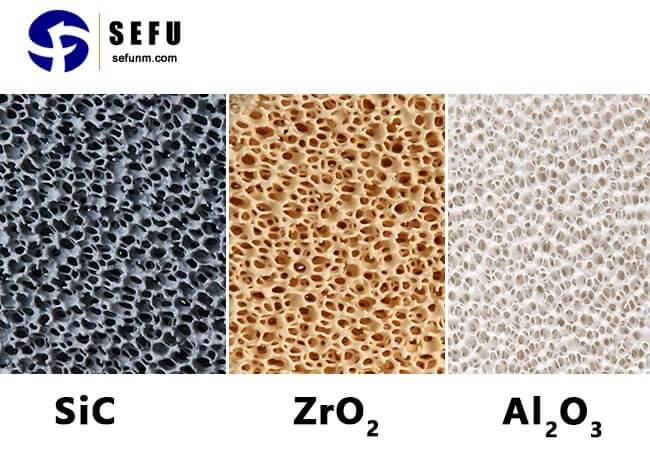Introduction
Ceramic foam filters are essential components in the metal casting industry, particularly in the production of aluminum, cast iron, and other non-ferrous alloys. These filters play a crucial role in enhancing the quality of castings by removing impurities and inclusions from molten metal. To understand the technical specifications of ceramic foam filters, it’s important to recognize that their quality is primarily determined by the choice of raw materials.
Raw Material Selection
The quality of a ceramic foam filter is intrinsically linked to the selection of its raw materials. The primary raw materials used in ceramic foam filters are silicon carbide (SiC), alumina (Al2O3), and zirconia (ZrO2). Each of these materials offers unique properties and advantages:

Silicon Carbide (SiC):
Silicon carbide is one of the most commonly used materials for ceramic foam filters. It is known for its high thermal stability, excellent resistance to corrosion, and superior mechanical strength. SiC filters are ideal for use with molten aluminum and its alloys due to their exceptional thermal shock resistance.
Alumina (Al2O3):
Alumina-based ceramic foam filters are suitable for casting processes involving cast iron and other non-ferrous alloys. Alumina filters are characterized by their high melting point, good chemical resistance, and thermal conductivity, making them effective at filtering out impurities during casting.
Zirconia (ZrO2):
Zirconia-based ceramic foam filters are often used in extreme temperature applications, such as casting titanium and superalloys. Zirconia filters offer excellent thermal stability, high-temperature resistance, and exceptional strength.
The choice of raw material depends on the specific casting process and the metal being used. For instance, silicon carbide filters are preferred in aluminum casting due to their unique properties that withstand the high temperatures and reactivity of molten aluminum.
Pore Size and Porosity
The pore size and porosity of ceramic foam filters are key technical specifications that determine their filtration efficiency. Filters with smaller pore sizes are more effective at trapping fine impurities, while those with larger pores allow for faster metal flow. The porosity also affects the overall permeability of the filter, influencing the casting process. The size and distribution of pores can be tailored to meet the requirements of the casting process, ensuring that impurities are effectively removed while maintaining optimal metal flow.
Thickness and Density
The thickness and density of ceramic foam filters impact their mechanical strength and durability. Filters with greater thickness and density tend to have higher mechanical stability and are less likely to break or deform during use. However, these filters may have a reduced filtration efficiency due to the larger volume of material for the molten metal to traverse. Striking a balance between thickness, density, and filtration efficiency is essential in filter design.
Coating and Surface Treatment
Ceramic foam filters can be coated or surface-treated to enhance their performance. Common coatings include colloidal silica, alumina, or zirconia. These coatings help improve the filter’s resistance to erosion, enhance its durability, and extend its service life. They also aid in reducing the wettability of the filter by molten metal, preventing the filter from clogging prematurely.
Shape and Size
The shape and size of ceramic foam filters are customized to fit specific casting molds and requirements. Filters are available in various shapes, such as round, square, and custom designs, to match the dimensions of the casting. Size considerations are crucial to ensure that the filter fits snugly within the gating system.
Conclusion
Ceramic foam filters are indispensable tools in the metal casting industry, responsible for maintaining the quality of castings by removing impurities and inclusions from molten metal. The technical specifications of these filters, such as raw material selection, pore size, thickness, density, coating, and size, are critical in determining their performance. By carefully choosing the right materials and design parameters, manufacturers can optimize the efficiency of ceramic foam filters and improve the overall quality of their castings. Proper filtration is key to producing high-quality, defect-free metal castings, making ceramic foam filters an invaluable part of the casting process.

